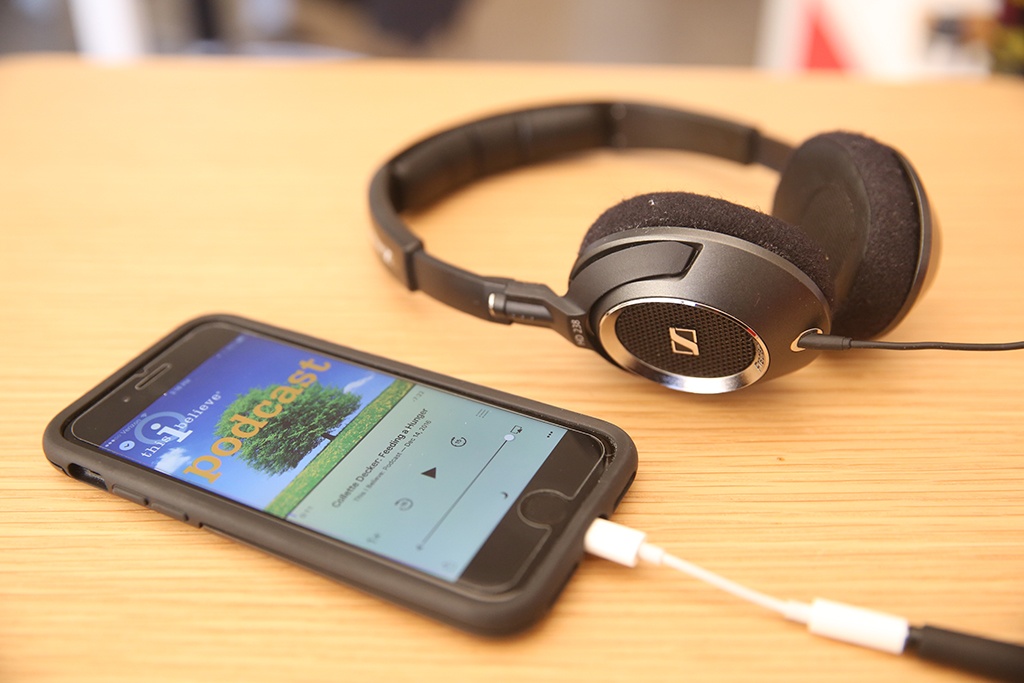Eighth grade English teacher Anne Connerty's assignment for creating a podcast requires students focus on reflection, process, and storytelling through spoken word. We talked with her about the assignment and what it was like for her students to challenge themselves in auditory learning in a world dominated by visual learning cues.
1. What was the assignment?
The assignment stemmed from a unit that we're doing on the power of words. We studied the concept of whether or not words carry power. Students read speeches, novels, etc. and through all that we talked about the concept if words really do carry power. That led to us doing our own podcast and creating our own piece of what we believe in and what we care about.
2. What was the process of this assignment?
The process was first immersing ourselves and listening to published podcasts from This I Believe. I chose five podcasts because I wanted them to really listen, listen, listen and notice and name what they were hearing. I wanted them to get used to sitting and listening and not seeing anything and have no visual stimulus but just listen to the voice. I wanted to have them see how wonderful that is, or for some of them to see how frustrating that is, so getting them used to the genre was important.
Then we discussed what we saw or observed and then created a template together. The template listed out what was needed to create a podcast. Some kids used it, some kids didn't use it. Some kids have the ability to go off on their own and didn't need it. And then it was time to start drafting whether it was with a template or no template.
Drafting is like a brain dump – the key is the revision here and the editing of the writing and the revisioning and editing of the actual recording. Sometimes kids get held up on the writing but this year I realized I didn't even want to see the writing. Last year, we had them write a personal essay and the podcast fell flat because the kids would read right from a piece of paper. Part of the template we made said podcasts should be very casual, very conversational, almost off the cuff though very planned. When you're just listening to the human voice you want it off the cuff but clearly content rich and planned. That was one of the reasons why I said I wasn't even assessing the essay this year. We're doing the template; the only thing I am going to assess is the audio of it.
Some kids did two recordings, others did ten recordings. We would listen to the recordings and if you walked into our room in the two days when we were revising and re-recording you would see everyone including myself with headphones on listening on their computers or iPhones.
There was one student's podcast we loved. I asked her if it was okay to share with the rest of the class because it was so wonderful and it was also such a great model for our own. When we shared her's you could see the light bulbs of her classmates go off. It's nice to show models in the beginning but it's also nice to show more models during revisioning and editing because the kids have their own aha moment about theirs.
I feel like the process they went through in this is so vital yet they might not value it as much as we adults do watching them. They started from scratch and ended with this podcast and whether it's an A+, B, whatever – it doesn't matter. I wish I could evaluate their process because some kids who went through it had incredible realizations midway through. For instance, they can self-reflect and see how important the anecdote is.
Click here to listen to all of the 8th grade student podcasts.
3. Why do you think podcasts are a great medium?
We're very visual. The kids are always watching videos and writing and are not as much of auditory learners so I wanted them to practice the amazement of hearing a story and not just seeing it. It's good to learn things differently and to be sitting there and having to listen to something without seeing anything, it's almost like the verbal reading...it's like the read-aloud, actually. It's a really beautiful way to hear the voice. At first listen of example podcasts, they almost had to stop and restart because they're not used to sitting there in quiet with no other stimulation but the human voice.
4. Why did you base this on 'This I Believe'?
Those pieces are amazing. They're so simple and so accessible and anyone can do one and see some success in it and I think that's why it's such a nice model because of its simplicity. Another thing I love is that it's just the common person doing it, it's not some famous radio announcer. The kids got to choose something they were really passionate about, that they really cared about and something they wanted to reflect on and share.
5. As students worked on this assignment, what were some challenges you saw them face?
What's consistent with middle schoolers is the lack of content and something we work on all year is learning how, and when and what is important content to include. We immersed ourselves into listening to podcasts first. We probably listened to five and analyzed each one and noticed what they all have in common and what made them different. Through this activity, they created their own template for a podcast. They realized that anecdotes are really important as content.
The biggest challenge was getting them to really dig deep and figure out 'why do you even care about this topic?' For instance, one student picked 'apologies.' Instead of saying, 'I picked apologies because I think it's really important,' why did you actually pick that? 'I told you you could pick anything you care about, why apologies?' 'Well my sister and I fight and we think it's important to apologize.' That's not that interesting, right?
When we dug deeper and deeper she realized 'you know what, the apologies are important to me because the lack of apologies have torn my family apart.' That's where you get to the heart of the matter and I think getting to the heart of the matter or getting that 'aha' moment or the 'so what' of it...I think that's probably the hardest thing about it.
That's why the process is so vital. And it's a big process because it involves technology, it involves writing, it involves speaking and it involves that reflection and consideration you're giving. I think that's what's so important about it.

6. How did you achieve that casual nature in these recordings when there definitely was drafting and revising and editing on these pieces?
If the kids know their material really, really well and they believe in it and they love it, they're going to have their bullet point notes or their template and they're going to have that 'I know everything I'm talking about' moment. There became a point during the writing when I said 'just stop writing right now.' One student was becoming paralyzed by the writing because she's so used to wanting to get a good writing piece. I told her she wasn't permitted to write anymore and to go right to the recording. That shifted her piece beautifully because otherwise she would've gotten too caught up in the writing. The thing about podcasts is the focus on the power of story – like what is the story behind this topic?
7. What do you think your students got out of this assignment?
They got to hear their voice on multiple levels and I think they got to reflect on something they really care about and process through that topic. This gave the kids time to really dig deep on a topic that interested them. Some of them used this for their 8th grade project which allowed them to dig even deeper. The point really is that on multiple levels they got to share their voice.



